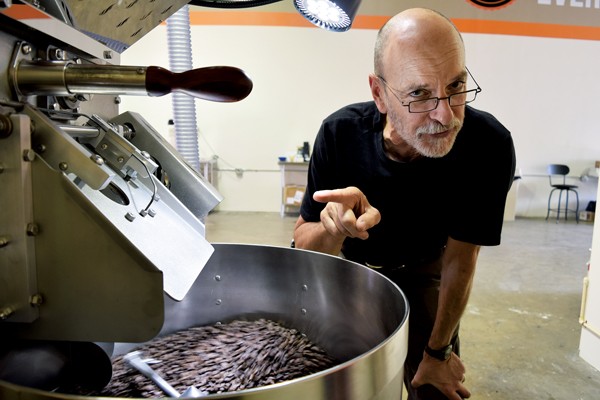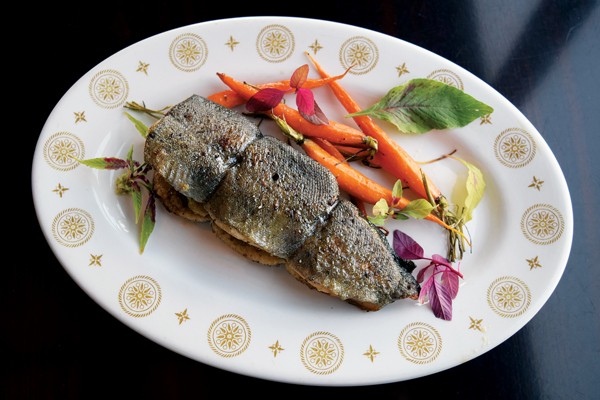For most of us, making a cup of coffee is pretty straightforward: You get the grounds out of the cupboard, get the maker set, and press “start.” But for Jimmy Lewis, the process is a bit more complicated. Take today’s cup: It started halfway across the world, on a sun-kissed hillside in the highlands of Nicaragua.
“These beans,” enthuses Lewis, “were grown by a young guy in his 30s, a graduate of Washington University. He did his thesis about the working conditions of coffee growers, and he ended up buying a farm.”
 John Minervini
John Minervini
Jimmy Lewis of Relevant Roasters
Lewis is the founder of Relevant Roasters, a coffee wholesaler that recently opened on the corner of Broad and Tillman. His aim is twofold: Teach Memphians to brew better coffee while making better, more mindful decisions about the things they buy. It’s a sentiment that is summed up in the company motto: “Every Cup Matters.”
“I wanna be relevant,” Lewis explains. “And the best way I know how to do that is to model a behavior that says life can be more fulfilling when you consider the meaning of your actions and how they affect others.”
Lewis works directly with growers in Ethiopia, Sumatra, and Nicaragua, selecting only those farmers who treat both their workers and the environment well. But sourcing good beans is only half the battle. The real work begins when the coffee arrives in Memphis.
To roast the beans, Lewis purchased a Loring Smart Roaster, a shiny, futuristic device that looks like the front of a stainless steel steam engine. At a cost of $78,000, it was a considerable investment, especially when compared to more traditional roasters. But Lewis says he chose the Loring for two important reasons.
The first is environmental. Because of its cutting-edge design, the Loring uses up to 83 percent less fuel than conventional drum roasters, while producing a fraction of the smoke. The second reason is good, old-fashioned flavor. Unlike most roasters, the Loring heats by convection, which produces a smoother, brighter, cleaner-tasting coffee.
The results are good enough to sip. The cup of medium-roast Nicaraguan coffee I tried had a rich mouth feel and a pleasant progression of flavors, including caramel and lemon zest. To experience it yourself, visit Relevant Roasters this week; they’re hosting a preview in their tasting room from Thursday-Saturday, 7 a.m.-10 a.m. Or buy a pound of Relevant coffee ($12.95) at Miss Cordelia’s on Mud Island.
“Local” has long been a buzzword among foodies. In short: If it’s not from around here, we don’t want any. But the team at Bounty on Broad (set to open on Wednesday, October 8th) has taken that concept to a whole new level. Beyond the 20 or so regional farms that supply Bounty with meat and veggies, there’s a whole host of local businesses that quite literally built the place.
“We get our beer from about 300 feet away,” says chef Jackson Kramer. “We get our coffee from 500 feet away. We bought most of our kitchen equipment at Chef’s Supply; that’s about 200 feet away. And we get our light bulbs at Light Bulb Depot, which is right across the street.”
A good illustration of Bounty’s commitment to local is the restaurant’s signature dish: the Bounty Bowl. Each week, Kramer calls around to local farmers and builds an entrée around what’s in season. Available in both an “herbivore” ($13) and a “carnivore” ($18) version, this week’s bowl features heirloom tomatoes from Whitton Farms and butternut squash from True Vine Farms.
 John Minervini
John Minervini
Bounty on Broad’s Stuffed Mountain Trout
Bounty is located at the west end of Broad in a 100-year-old dry goods store, incorporating salvaged wood, brick, and tile from the original structure. But ultimately, because of rotten joists and deteriorating mortar, the building had to be gutted.
“At one point,” remembers Kramer, “there was nothing left standing except the front wall. No ceiling, no floor. Just dirt.”
The new space is light and airy, with polished concrete floors and a prominent diagram showing the different cuts of meat on both a pig and a cow. It’s a sign of things to come: In about a month, Kramer plans to open a butcher shop on Bounty’s ground floor. There he will break down local pork, beef, chicken, and lamb into fresh cuts, for sale.
“I’m a true believer in the way something is raised, how it comes out in the flavor of the meat. And if you drive up to Circle B [Ranch, in Seymour, Missouri], all you have to do is take one look at these pigs to know that they’re happy.”
To get a taste of Kramer’s butchering chops, try the lamb tartare ($12). Served with toast points, grated egg white, and watercress, the ground lamb is unforgettable, its mild, fresh flavor beautifully accentuated by pickled capers and lemon vinaigrette.